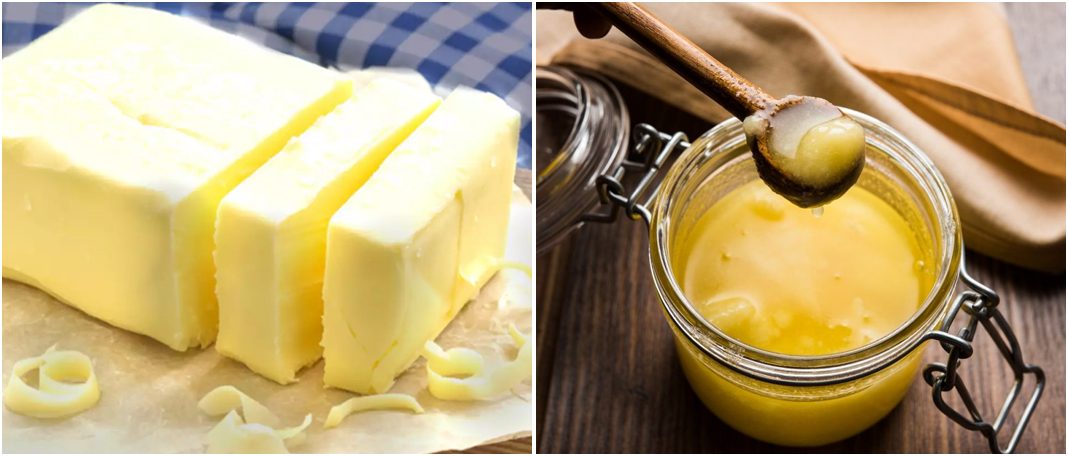BUTTER
Butter is usually made from cow’s milk. When the milk is put to rest, a lot of fatty components come floating to the top. This fatty substance is cream, and when the cream is churned, the fatty components come together to form a semi-solid substance called butter. It can also be made from other farm animals such as goats, sheep, and buffaloes. Butter is rich in terms of vitamins A, vitamin D, vitamin E, vitamin B12, and vitamin K2. Non-dairy kinds of butter like peanut butter, apple butter, and cocoa butter have the same consistency as regular butter.
Nutritional benefits of Butter
- When added to a low-carbohydrate diet, butter helps maintain weight and is known to help in weight loss.
- It contains calcium, which is good for bones.
- When consumed in an appropriate amount, it reduces the chances of obesity.
- Butter is rich in beta-carotene, which reduces the risk of lung cancer and also lowers the chances of vision loss.
- Saturated, monounsaturated, and dairy trans fats are the primary types of fat found in butter. Monounsaturated and polyunsaturated fats aid in the maintenance of normal cholesterol levels and provide protection from heart disease.
GHEE
Butter is heated to make ghee. This causes the milk particles to sink to the bottom while the liquid component evaporates. What remains is a golden-yellow liquid, ghee.
What are the nutrients in ghee?
Ghee contains Omega-3 and Omega-9 fatty acids.
| Omega-3 fatty acid | Reduces inflammation and improves blood sugar control. |
| Omega-9 fatty acid | Energy source and responsible for the proper working of internal organs, blood vessels, and immune system. |
Ghee is lactose-free, cures thyroid dysfunction, and is a great appetizer.
Ghee produces enzymes that are known to fight carcinogens.
Ghee is a low-fat food that does not contribute to heart disease unlike other fats.
Ghee aids in the development of a healthy gut.
Ghee contains vitamin A and vitamin E, which aid in hormone balance and keep the liver healthy.
Is ghee high in protein?
To this, the answer is no. Ghee contains zero protein and is totally free of the milk sugar lactose and the milk protein—casein—that gives milk its white color.
Ghee vs. butter nutrition
Even though ghee is obtained from butter, their nutritional values differ.
Butter contains 51% saturated fat, while the saturated fat in ghee is 60%. Butter has trans fat, which is considered a bad nutrient. Butter contains 3 grams of trans fat, while ghee is trans fat-free.
If consumed in the right amount, both ghee and butter are beneficial. Hope this blog helps in gaining some knowledge about ghee and butter.















